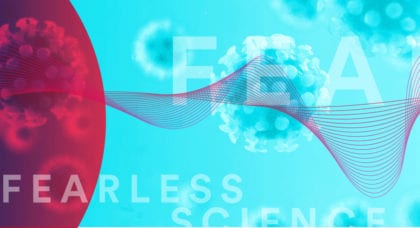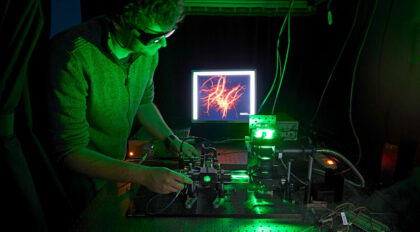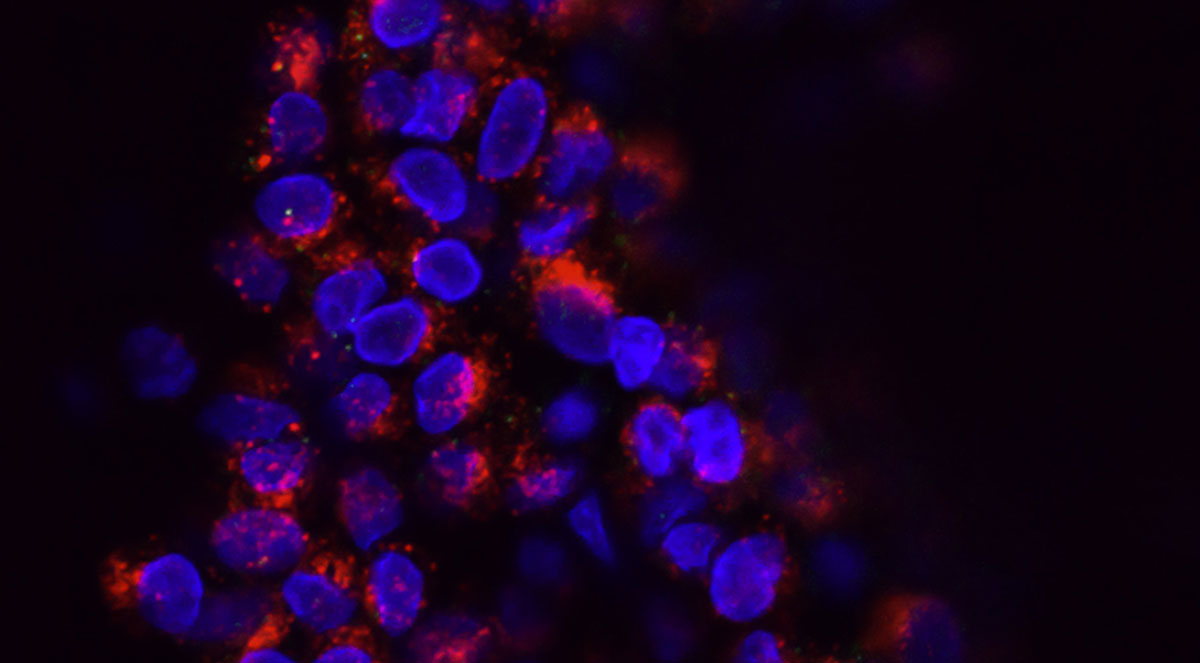Cancer Research at the Morgridge Institute
Areas of Expertise
- Biomedical imaging & microscopy
- T-cell immunotherapies
- Tumor microenvironments
- Viral-induced cancers
Cancer-specific research
- Pancreatic cancer
- Breast cancer
- Cervical cancer
- Neuroendocrine cancer
- Blood cancer
The basic biology of cancer is still largely a mystery. That’s why fundamental, early-stage research is essential to helping clinicians and cancer researchers study, diagnose, and treat cancers.
At the Morgridge Institute, scientists across biology are working to better understand and stop cancer. Our teams in biomedical imaging, virology, bioinformatics, and metabolism are working with cancer researchers at the UW Carbone Cancer Center, the National Institutes for Health and Stand Up to Cancer to drive new advances.
In biomedical imaging, scientists are developing advanced tools to diagnose cancer earlier and test new drugs and therapies faster. They are applying novel imaging techniques, such as fluorescence imaging, to study some of the deadliest cancers, like pancreatic cancer which kills more than 90 percent of people within the first five years of diagnosis.
These techniques are opening new pathways to test drug responses in lab-grown cancer samples, and study slow-growing neuroendocrine tumors. Non-invasive imaging is also an important testing ground to understand how other cell types in the body, like T-Cells and macrophages, could slow, stop, or even speed up cancer in some patients.
Morgridge experts in virology, metabolism, and bioinformatics are also contributing new knowledge about the unique environments that tumors create inside the body, and how some viruses, like Human Papillomavirus (HPV) and Hepatitis C, can lead to cervical and liver cancers respectively.
But it’s not just scientists in the lab who are helping fight cancer. Computer scientists and bioinformatics experts are important partners in cancer research. Experts here are making new ‘big data’ tools that help cancer researchers screen, test, and review therapeutics against the huge, growing body of data, research and information
In the News
Morgridge scientists take on new research challenges

Study shows environmental conditions alter dependence on a key metabolic enzyme
At the intersection of genetic rules and environmental conditions, scientists at Morgridge are gathering new insights about how diseases function in the human body.

Shaping the Future of Women’s Health: Insights and Innovations
Despite the many advances in human health, research focused on women’s health has a more complex history. Experts discussed this topic through the lens of discovery, prevention, and access to care during a Fearless Science Speaker Series lecture on March 17, 2025.

Morgridge postdoc breaks down barriers of cancer therapy at Falling Walls Lab Competition
Morgridge postdoc Amani Gillette took center stage at the international Falling Walls Lab Competition, presenting a pitch for SeLight, LLC, her startup focused on CAR T cell therapy research.

New Morgridge investigator explores complex link between viruses, cancer
Viruses are responsible for nearly one in every five cases of human cancer. New Morgridge Investigator Megan Spurgeon is on the front lines of understanding the inner workings of this public health threat.

Morgridge scientist aims to shatter the ‘ballistic barrier’ in imaging
With support from the Chan Zuckerberg Initiative (CZI), Morgridge investigator Randy Bartels will be on a quest to break the “ballistic barrier” in biomedical imaging to peer more deeply into living tissue.

Skala Lab’s photonics-based imaging featured in UW Health News
Melissa Skala's technology harnesses the natural light produced by cells in order to track response to cancer drug treatment.
Help Scientists
When you give, you’re helping scientists improve human health. Morgridge scientists are fighting deadly diseases and contributing new research to stop COVID-19, cancer, HIV/AIDS, and other disorders.
Current Projects
Here is a sampling of some cancer-related research initiatives at Morgridge.
- Skala Lab
The majority of our work is focused on cancer imaging, using photonics-based technologies. The most exciting ongoing project is in cancer immunology, including imaging new therapies in mouse models and immune cell engineering. We also are developing robust quality control technologies for T cell manufacturing, for use in immunotherapy. Another major focus is on developing cancer organoids for high-throughput testing of wide range of potential chemotherapies. We work closely with oncologists to collect fresh patient biopsies that are maintained in 3D culture (tumor organoids), which are used to screen response to multiple treatment options for each patient. In work sponsored by Stand Up to Cancer, we are seeking ways to identify metabolic vulnerabilities of cancer.
- Coon Lab
Cancer investigators rely on myriad technologies to gain insight into mechanisms of cancer progression and successful therapeutic approaches. Critical to their investigations is the analysis of the important biological actors — the molecules like proteins and metabolites that are at the heart of all cellular functions. Our cutting-edge mass spectrometry resources have become critical for many aspects of cancer research across UW–Madison, including understanding the aberrant cellular function of cancer cells, discovering critical cancer progression biomarkers, and guiding therapies for cancer treatment. We founded the Cancer Metabolomics and Proteomics Resource (CAMP) to generate large-scale quantitative data for these molecules in support of researchers at the UW–Madison Carbone Cancer Center. We have collaborated with more than two dozen UW–Madison cancer investigators in the past five years.
- Gitter Lab
My computational biology team is using biological networks and pathways to interpret multiple types of cancer-related “omic” data: genomic, transcriptomic, proteomic, etc. The first project is with Morgridge Virology Investigator Paul Ahlquist and several UW–Madison collaborators. We’re using pathway analysis algorithms to come up with a better consensus understanding of what cellular changes are driving cancer when individual measurements (such as DNA changes or gene expression changes) disagree. Our collaborators are working on head and neck cancer. A second project has similar goals but is using more modern computational tools and will be capable of reasoning with more data types. We also have an early drug screening project with a Wisconsin Institute for Research collaborator, hoping to identify new chemicals to inhibit an important cancer-related protein.
